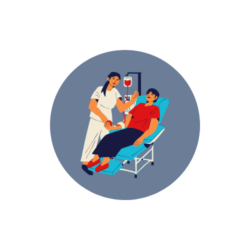Glutathione
Naturally occurring antioxidant substances in the human body are called glutathione. It consists of 3 basic amino acids; gicin, L-cysteine and L-glutamate. Glutathione, which strengthens the immune system, also scavenges free radicals in the body. This substance is produced in both cells in the central nervous system and liver cells. So, what is glutathione? What causes glutathione deficiency? You can find the details in our article.
Chose Your Topic
Get in Touch
Get professional treatments in Turkey at Lygos Clinic, offering effective, affordable treatments for a healthier and more aesthetically pleasing life.
You can contact us via WhatsApp and Instagram for a quick response.

What is Glutathione?
Glutathione, a natural antioxidant substance, strengthens the immune system. This naturally occurring substance in the human body is produced in the cells of the central nervous system and liver cells. Glutathione contains 3 essential amino acids such as glycine, L-cysteine and L-glutamate.
Glutathione, which helps the body fight free radicals, can be affected by conditions such as malnutrition, environmental factors and stress. Therefore, glutathione levels may decrease. In case of a decrease; methods such as liquid, capsules and serum can be used. It is necessary to pay attention to glutathione deficiency in order to heal heart diseases, regenerate tissues and strengthen the immune system.
What Causes Glutathione Deficiency?
- Aging
- Stress
- Smoking and alcohol
- Some medicines
- Cancer
- Liver diseases
- Diseases of the immune system
- Neurodegenerative diseases
What are the Symptoms of Glutathione Deficiency?
- Drug tolerance
- Inflammation
- Oxidative stress
- Immune problems
- Fatigue
- Evasion
- Liver problems
- Chronic diseases
- Neurological problems
How is Glutathione Treatment Done?
Glutathione, a powerful antioxidant, is naturally synthesized in the body. At the same time, this substance, which is naturally present in the body, has very important tasks. A decrease in glutathione level can lead to some health problems. High glutathione levels also have a risk of causing problems. Therefore, glutathione treatment may be required.
The doctor who makes the necessary interview with the patient before the treatment informs about the process. Glutathione treatment may not be recommended for pregnant women and nursing mothers. However, it is not possible to make any decision without seeing a doctor.
After the necessary interviews are completed, glutathione treatment can be applied in capsule or liquid form. It is aimed to increase the glutathione level in the body. Therefore, it is critical to pay attention to the foods to be consumed.
Serum can also be made in glutathione treatment. In this way, cells are renewed and the immune system is strengthened. Serum, which prevents possible diseases, should be applied with the approval of a doctor.


First Step
A conversation between the patient and the doctor takes place.

Second Step
Some tests can be done to assess your glutathione levels and your general health. These may include blood tests, oxidative stress markers and general biochemistry tests.

Step Three
Depending on the test results and your personal health situation, your healthcare professional will create a treatment plan that is right for you.

Step Four
Direct intravenous administration of glutathione allows for faster and more effective absorption. It is usually done in a clinic or hospital.
What are the Benefits of Glutathione?
- It is good for the immune system.
- Supports liver function.
- Reduces the effects of aging.
- It has benefits against diseases such as Alzheimer's and Parkinson's.
- Slowing down the aging of the skin, it prevents the formation of wrinkles.
- Glutathione benefits include preventing the growth and spread of cancer cells.
Which Diseases is Glutathione Treatment Good for?
- It is good for respiratory diseases.
- It reduces oxidative damage in children diagnosed with autism.
- It strengthens the immune system against autoimmune diseases.
- Glutathione has benefits against the negative effects of diabetes.
- It helps to reduce oxidative stress.
- It improves insulin resistance, especially in elderly people.
- It has an effect against fatty liver.
- It alleviates the symptoms of diseases such as peripheral artery.
- Reduces and soothes the symptoms of Parkinson's disease.

What are the Side Effects of Glutathione?
Glutathione does not pose any risk because it is naturally found in organic foods. It should also be noted that this substance, which can also be taken artificially, is not suitable for every person.
Glutathione may not always be a necessary substance. Therefore, it is absolutely necessary to consult a specialist doctor for glutathione treatment. Correctly planned treatment can also prevent side effects. So, what are the side effects of glutathione?
- It may cause allergic reactions to occur. Widespread or localized rashes can be given as an example of this situation.
- Side effects such as swelling, cramps, indigestion may occur.
- Glutathione side effects include bronchial constriction. This substance, which also causes contraction, can also cause shortness of breath.

Liposomal Glutathione
Glutathione; It can be taken by methods such as liquid, food, serum. This substance, which can also be taken by capsule, has many options. Liposomal glutathione is one of these options. This substance, which is usually used as 30 capsules, varies between 200 and 450 mg.
Liposomal glutathione prevents possible problems by strengthening the immune system. This substance, which also helps to remove free radicals, is known to be good for heart disease and tissue regeneration. As a result, liposomal glutathione can be used for multiple problems. However, it should be remembered that the best decision should be made after consulting a specialist.
How to Increase Glutathione Levels?
Glutathione levels are increased by more than one method. This antioxidant substance, which is naturally present in the body, can be increased by consuming organic foods. While consuming natural products does not cause any side effects, they should not be consumed unconsciously.
Glutathione levels can also be increased with the help of capsules. Capsules produced by many companies should be consumed after approval by a doctor. The same applies to serum. Options such as liquid consumption are also preferred to increase glutathione levels.

Foods Containing Glutathione
- Brussels sprouts
- C cauliflower
- Broccoli
- Herbaceae
- Garlic
- Onion
- Legumes
- Chicken
- Fish
- Protein sources low in fat

Glutathione Serum Costs
Glutathione serum costs are determined according to the needs of the patient. The amount of serum is adjusted to ensure glutathione balance and this varies for each patient. Therefore, the cost can be expected to increase or decrease. The hospital where the procedure will take place is also an important detail.
IV treatment in a well-equipped hospital will not cost the same as treatment in an ordinary hospital. The experience of the doctor examining the patient also affects glutathione serum costs. As a result, giving a clear figure about costs may mislead the patient.
By contacting the hospital, you can prevent possible misinformation and get more detailed information about the process. If you want to ask what you wonder about the subject and get information about glutathione serum prices, you can contact Lygos Clinic's expert team.
Glutathione Treatment Costs
Glutathione treatment costs vary depending on methods such as serum and capsules. It should be known that these methods, which are determined according to the needs and health status of the patient, are not applied according to the same costs. In addition, the quality of the materials used also affects the costs. As a result, the cost of quality products is higher.
Glutathione treatment costs are also determined according to the city in which the hospital is located. The costs of the treatment applied in a rural area and the treatment applied in a metropolis are different. Therefore, it is recommended that you call the hospital where you will be treated to get information about costs.

Get in Touch
Get professional treatments in Turkey at Lygos Clinic, offering effective, affordable treatments for a healthier and more aesthetically pleasing life.
You can contact us via WhatsApp and Instagram for a quick response.


